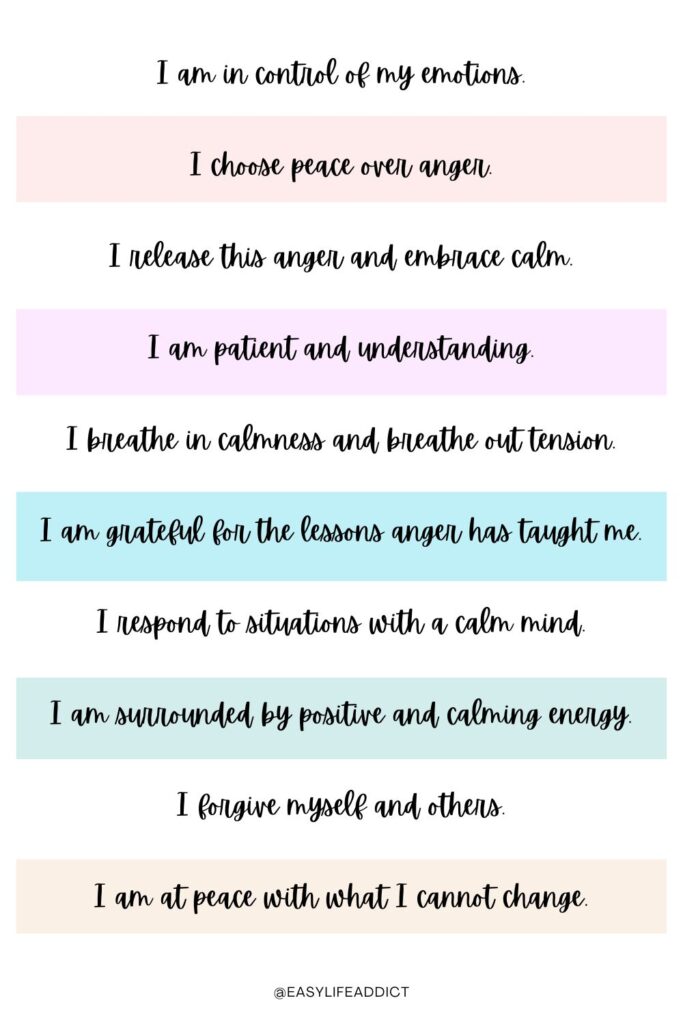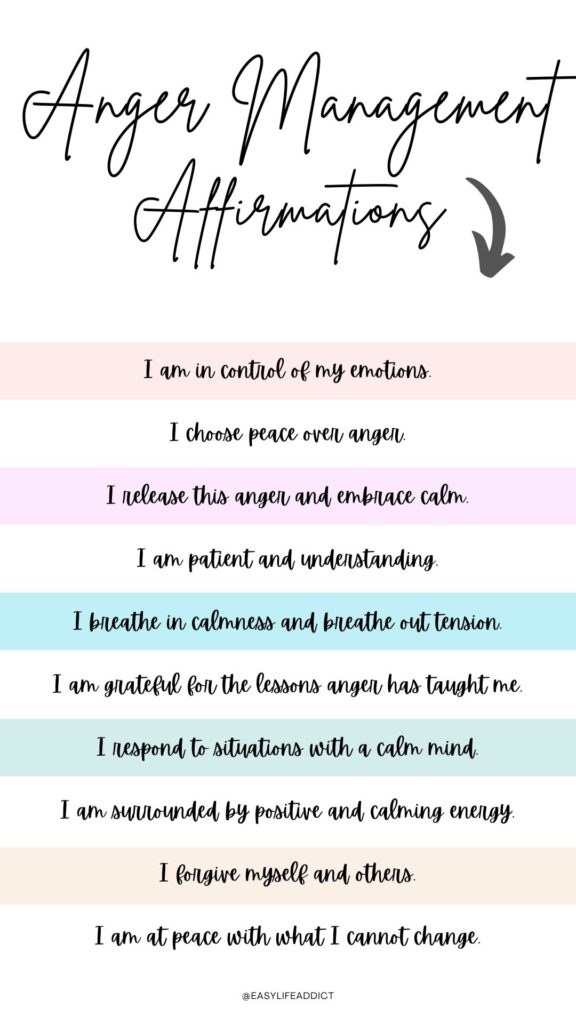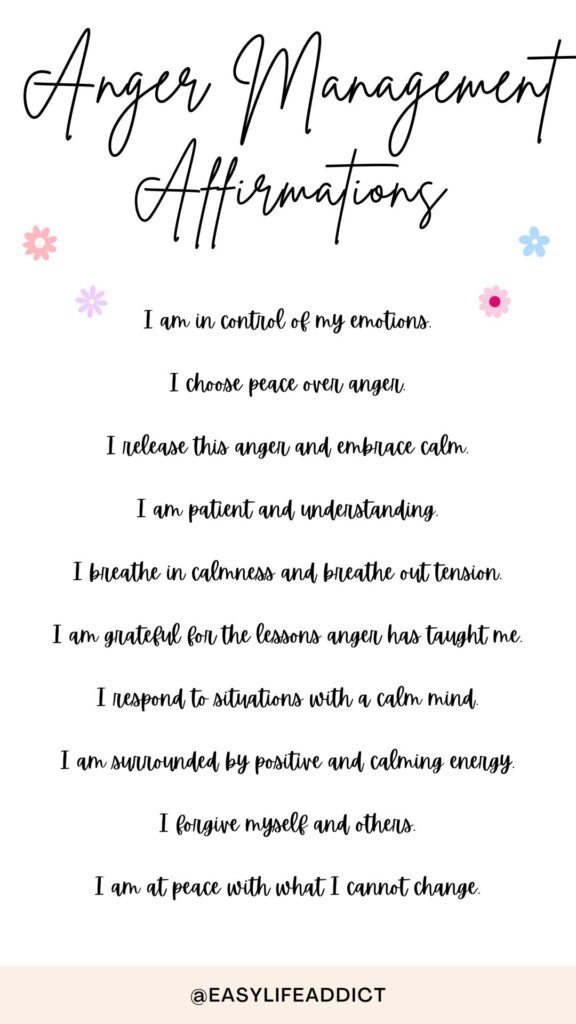10 Calming Affirmations for Anger Management!
Discover ten calming affirmations for managing anger. These positive affirmations will help you cultivate inner peace and tranquillity, allowing you to bid farewell to anger through self-encouragement.
This post may contain affiliate links. That means if you click on a link and purchase something I recommend, I will receive a small commission at no extra cost. As an Amazon Associate, I earn from qualifying purchases. This helps keep my website up and running and is very appreciated. Thank you for your support! You can read my full disclosure policy here.
Understanding Anger and Its Impact
Anger is a natural emotional response to perceived threats, injustices, or frustrations. It is characterised by feelings of irritation, rage, or hostility. Physiologically, anger triggers the body’s ‘fight or flight’ response. This survival mechanism prepares the body to either confront the threat or flee from it. When we get angry, our body releases stress hormones such as adrenaline and cortisol. These hormones increase our heart rate, elevate our blood pressure, and give us a burst of energy, preparing us for action.
Psychologically, anger can cloud judgment, impair decision-making, and lead to impulsive behaviours. Common anger triggers include feeling disrespected, experiencing injustice, or facing obstructions to personal goals. While anger is a normal emotion, its chronic presence can have detrimental effects on mental and physical health. Unmanaged anger can contribute to conditions such as chronic stress, anxiety, and depression. Over time, these conditions can weaken the immune system, increase susceptibility to illness, and exacerbate existing health issues.
Effective anger management is crucial for maintaining overall well-being. Learning to control anger can prevent the escalation of conflicts and reduce the risk of engaging in harmful behaviours. Techniques such as deep breathing and mindfulness can help calm the mind and manage anger more constructively. Deep breathing, for instance, can help slow down our heart rate and lower our blood pressure, which are both elevated when we’re angry. On the other hand, mindfulness can help us become more aware of our emotions and reactions, allowing us to respond to them more calmly.
In essence, recognising the triggers and impacts of anger is the first step towards managing it effectively. By adopting strategies to control anger, individuals can protect their mental and physical health and empower themselves to foster a more peaceful and balanced life.
The Power of Affirmations in Anger Management
Affirmations are positive statements that can help you challenge and overcome self-sabotaging thoughts. The psychological basis behind affirmations lies in their ability to rewire the brain, a process known as neuroplasticity. By consistently engaging in positive self-talk, individuals can alter their thoughts, influencing emotional responses. This cognitive restructuring fosters a more balanced and calm approach to triggers that might provoke anger.
Research in psychology underscores the benefits of using affirmations for anger management. Positive self-talk, for instance, has been shown to reduce the intensity of anger by promoting a sense of control and calmness. Affirmations serve as a mental tool that helps individuals replace negative, anger-inducing thoughts with constructive, soothing ones. This can significantly reduce stress and anxiety, creating a more serene and positive mindset.
Various psychological studies provide evidence supporting the efficacy of affirmations. A study published in the Journal of Clinical Psychology found that participants who practised daily affirmations reported lower anger and stress levels than those who did not engage in such practices. Moreover, testimonials from individuals who have successfully harnessed the power of affirmations further validate their effectiveness. For example, many people have shared experiences of feeling more composed and better equipped to handle frustrating situations after incorporating affirmations into their daily routines.
Incorporating affirmations into anger management strategies is not just a tool but a powerful pathway to achieving inner peace. By fostering a positive mindset and promoting calmness, affirmations can transform how individuals navigate emotionally charged situations, offering a beacon of hope and optimism. This practice not only reduces immediate feelings of anger but also contributes to long-term emotional well-being.
10 Calming Affirmations for Anger Management
1. “I am in control of my emotions.” This affirmation reminds individuals that they can manage their emotional responses. It encourages a sense of self-mastery and reduces feelings of helplessness during anger episodes. Repeating this affirmation during moments of stress can help reinforce a sense of calm and control.
2. “I choose peace over anger.” By consciously prioritising peace, this affirmation helps shift focus away from anger. It serves as a mental cue to seek tranquillity rather than letting anger dictate reactions. Integrate this affirmation into daily meditation practices to reinforce a peaceful mindset.
3. “I release this anger and embrace calm.” Letting go of anger is essential for emotional well-being. This affirmation promotes the release of negative emotions and the acceptance of calmness. Use it during deep breathing exercises to facilitate the transition from anger to serenity.
4. “I am patient and understanding.” Cultivating patience and empathy can significantly diminish anger. This affirmation encourages a compassionate approach to conflicts and frustrations. Practice saying this affirmation in the morning to set a positive tone for the day.
5. “I breathe in calmness and breathe out tension.” Connecting affirmations with physical actions like breathing can enhance their effectiveness. This affirmation pairs well with mindfulness breathing techniques to reduce anger and increase relaxation.
6. “I am grateful for the lessons anger teaches me.” Viewing anger as a learning opportunity can transform its impact. This affirmation fosters a growth mindset, making it easier to navigate and learn from anger-inducing situations. Reflect on this affirmation in a gratitude journal to deepen its effect.
7. “I respond to situations with a calm mind.” Reinforcing the intention to respond calmly can pre-emptively mitigate anger. This affirmation is beneficial when anticipating stressful encounters. Mentally rehearse this affirmation before entering potentially triggering environments.
8. “I am surrounded by positive and calming energy.” Imagining oneself in an environment filled with positive energy can reduce feelings of anger. This affirmation can be visualised during meditation to create a mental space of tranquillity.
9. ‘I forgive myself and others.’ Forgiveness can dissolve anger and promote emotional healing. When we hold onto anger, it can eat away at us and prevent us from moving on. This affirmation encourages letting go of resentment and embracing forgiveness, which can be a powerful tool in managing anger. Repeat this affirmation during reflection or prayer to foster a forgiving attitude.
10. ‘I am at peace with what I cannot change.’ Accepting the limits of control can alleviate frustration and anger. This affirmation emphasises acceptance and peace with uncontrollable aspects of life, which is about recognising that there are some things we can’t change and being okay with that. Incorporate this affirmation into daily routines, such as morning rituals or bedtime reflections, to cultivate a mindset of acceptance and peace.

Integrating Affirmations into Your Daily Life
Incorporating calming affirmations into your daily routine is a commitment to your anger management and inner peace journey. One effective method to ensure regular practice is setting reminders on your phone or computer. These gentle prompts can help you pause and recite affirmations throughout the day. Alternatively, utilising affirmation apps to send notifications at specified times can keep you on track.
Visual reminders can also play a crucial role in reinforcing the practice of affirmations. Consider creating a vision board or placing sticky notes with affirmations in frequently visited areas like your bathroom mirror, workspace, or refrigerator. These constant visual cues will be powerful daily nudges to practice affirmations.
Consistency and patience are key to experiencing the benefits of affirmations. It’s essential to integrate them into your routine consciously and regularly. Start by dedicating a few minutes each morning and evening to recite your affirmations. Gradually, this practice will become a habit, seamlessly blending into your daily life and yielding noticeable results over time.
Combining affirmations with other anger management techniques can enhance their effectiveness. Deep breathing exercises, for instance, can complement your affirmations by helping you calm your mind and body. Practising mindfulness by staying present at the moment can prevent anger from escalating. Physical exercise, another good technique, helps release built-up tension and stress, making it easier to manage anger.
Final Thoughts
Adopting a holistic approach to anger management can lead to long-term benefits. Integrating affirmations with other methods like deep breathing, mindfulness, and physical exercise creates a comprehensive strategy for managing anger. This multifaceted approach addresses the immediate symptoms of anger and promotes overall mental and emotional well-being.
Ultimately, the journey to inner peace and effective anger management requires dedication and consistency. By thoughtfully incorporating affirmations into your daily life and combining them with other techniques, you take a significant step toward achieving lasting tranquillity and emotional balance.
Remember to check out our related resources for more tips and guidance on this important topic. Take control of your life and embrace a brighter future!
Thanks so much for stopping by; I appreciate everyone who takes the time to read and make it to the end! I have lots of exciting new content in the next few weeks, so make sure you pop back to catch up!









